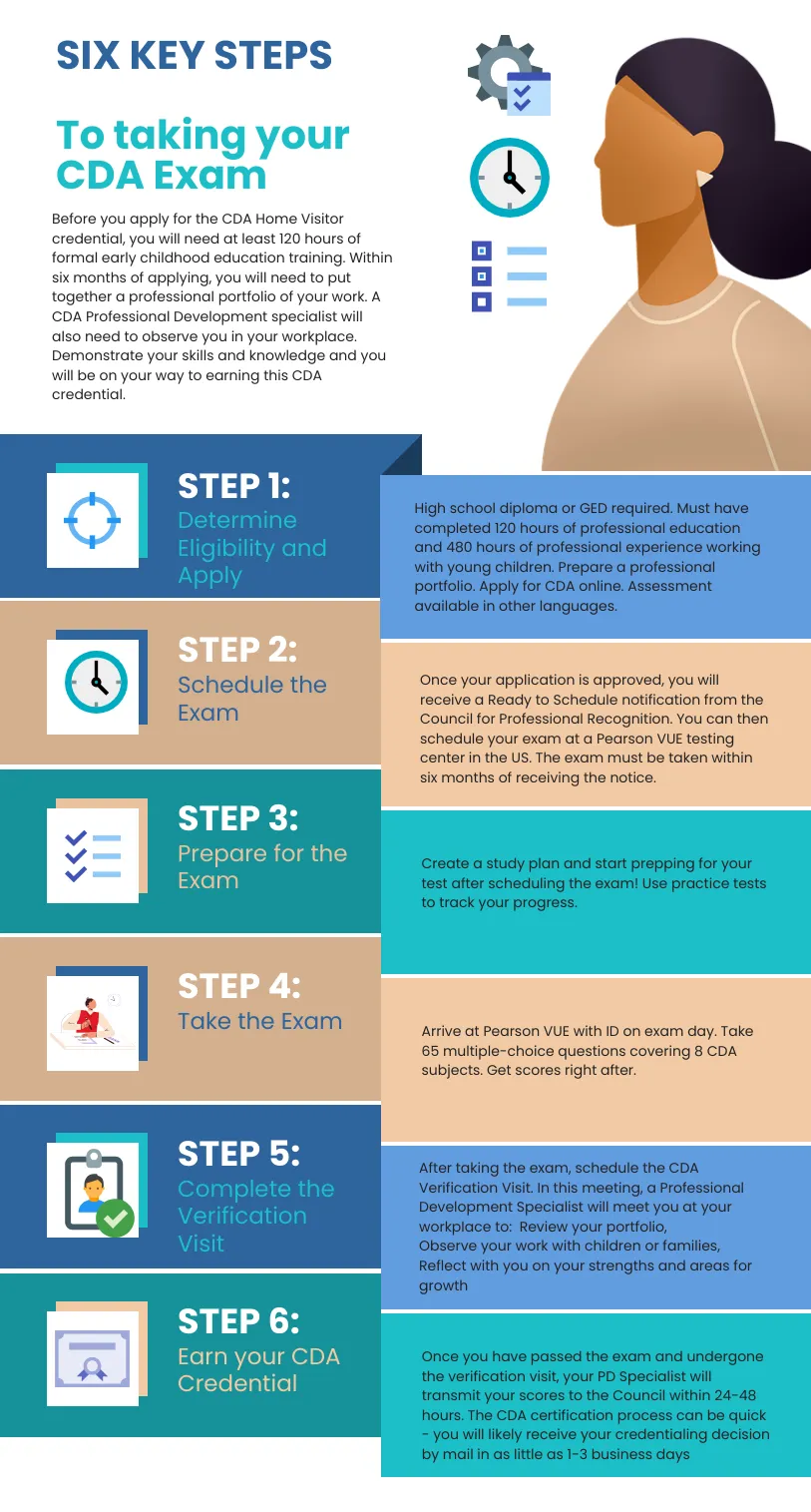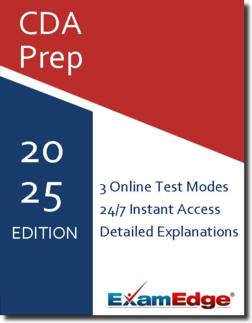CDA Exam & CDA Certification Info
What is the CDA?
The CDA , or the Child Development Associate credential, is a nationally recognized credential in the USA for early childhood education professionals. It is administered by the Council for Professional Recognition.
What are the Child Development Associate Certification Exams?
The Child Development Associate exams are designed to measure a person's understanding of the key ideas and concepts of childhood development. Created by the Council for Professional Recognition, CDA exams gauge the knowledge and readiness of professionals hoping to work with young children. Research on childhood development is constantly shifting and growing, so it is crucial that professionals in this industry stay updated on the latest findings.
You might hear the exam referred to by the following names:
- CDA
- CDA Certification
- CDA Credential
- CDA Exam
- CDA Test
- Child Development Associate Certification
- Child Development Associate Credential
- Child Development Associate Exam
- Child Development Associate Test
- Pearson VUE CDA Test
CDA Exam Overview
The Council for Professional Recognition offers exams for three CDA credentials. All CDA exams have the same structure:
- Time limit: 1 hour 45 minutes (105 minutes)
- Number of questions: 65 questions
- 60 traditional multiple-choice questions
- 5 scenario-based multiple-choice questions (with a short narrative and an image)
- Delivery method: Computer-based at a Pearson VUE testing center
Here is an overview of the various CDA exams offered by the Council for Professional Recognition:
- Child development theories
- Child safety and nutrition
- Family engagement strategies
- Child growth and development
- Effective teaching strategies
- Ethics
- Program management
- Toddler growth and development
- Safety procedures
- Educational strategies
- Communication with parents

Which CDA Exam Should I Take?
CDA certification is not always necessary for professionals who hope to work with young kids, but it can bolster their credibility as they search for a new job. Families, schools, and employers alike are all eager to work with professionals who have both the knowledge and experience required for such roles.
If you are hoping to elevate your career in early childhood development, certification is a great option. These exams can be challenging, though, so it is important to prepare thoroughly ahead of your test date. Exam Edge’s CDA exam practice tests can help ease this process and ensure a passing score.
There are three possible CDA exams you can take: CDA family, CDA preschool, and CDA toddler. Each exam is designed around the kind of work you are expected to do when working with your preferred age range or group. If you are not sure which test to sign up for, check with the CDA to learn more.

What is the CDA Family Certification Test?
The Child Development Associate - Family certification test is a professional assessment designed to evaluate an individual's competency in childcare and education within a family setting. It measures the candidate's understanding of:
- Child development theories
- Child safety
- Child nutrition
- Family engagement strategies
The CDA Family certifications exam also examines the applicant's ability to promote cognitive and emotional growth in children, including in special needs children. Earning certification signifies that the individual possesses the requisite skills and knowledge to provide high-quality childcare within a family or home-based setting.
The CDA Family Child Care credential serves as evidence of a candidate's talents, abilities, and knowledge on how to care for children under the age of five. This certification is helpful for anyone hoping to work in a daycare setting or as a nanny. To earn this credential, you will need to demonstrate your commitment to the principles of childhood development and learning.
This certification exam evaluates your ability in 8 subject areas:
- Planning a safe and healthy learning environment
- Advancing children's physical and intellectual development
- Supporting children's social and emotional development
- Building productive relationships with families
- Managing an effective program
- Maintaining a commitment to professionalism
- Observing and recording children's behavior
- Understanding principles of child development and learning
To be considered for the CDA Family Childcare credential, you will need a high school diploma or GED. High school juniors and seniors are also eligible if they are enrolled in an early childhood education training program. A total of 120 hours of such training is required of all applicants.
Once you apply for this credential, you will have six months to put together a professional portfolio of your work. A CDA Professional Development Specialist will come to observe your work and give you the final sign-off for you to take the CDA exam.

What is the CDA Preschool Certification Test?
The Child Development Associate (CDA) - Preschool certification test is a professional credentialing exam for individuals working with young children in a preschool setting. The test evaluates the applicant's ability to nurture emotional, physical, and intellectual development in preschoolers.
The CDA Preschool Certification exam covers areas such as:
- Child growth and development
- Effective teaching strategies
- Ethics
- Program management
In addition, the candidate must also demonstrate competency in:
- Building healthy relationships
- Implementing effective teaching practices
- Managing preschool learning environments
- Planning safe and healthy preschool learning environments
- Supporting both social and emotional growth in preschool-aged children and providing positive guidance
- Advancing both physical and intellectual competence
- Establishing positive and productive relationships with families
- Establishing a well-run, purposeful program that is responsive to participants’ needs
- Maintaining a strong commitment to professionalism
To earn the CDA preschool credential, you must first possess at least a high school diploma, GED, or be enrolled as a high school junior or senior in a career and technical program in early childhood education. Once you apply, you must obtain at least 480 hours of professional work experience in center-based settings with children between the ages of three and five.
A professional portfolio is also required. The references should reflect your skills and abilities. You will also be asked to schedule a CDA verification visit and exam.
By passing the test, educators earn the CDA Preschool credential, signifying their competence in preschool education, and demonstrating that they are committed to advancing the development of children.

What is the CDA Toddler Certification Test?
The Child Development Associate - Toddler certification test is a comprehensive evaluation that verifies a candidate's proficiency in caring for toddlers. The CDA Infant-Toddler Credential was created to acknowledge the skills and talents of those working with kids aged zero to 36 months.
The CDA toddler certification exam assesses knowledge of:
- Developmental milestones
- Safety procedures
- Educational strategies
- Communication with parents
Candidates must also demonstrate an understanding of a toddler's physical, cognitive, social, and emotional development. The test also reviews familiarity with age-appropriate activities and effective discipline strategies. This certification is crucial for professionals in early childhood education such as daycare providers, preschool teachers, and childcare specialists.
Specifically, this exam evaluates your ability to:
- Plan a safe and healthy learning environment
- Advance children's physical and intellectual development
- Support children's social and emotional development
- Build productive relationships with families
- Manage an effective program
- Maintain a commitment to professionalism
- Observe and record children's behavior
- Understand principles of child development and learning
To earn your CDA Infant-Toddler credential, you will first need to possess a high school diploma, GED, or be a high school junior or senior in an early childhood education program. 120 hours of formal training is also required. Within three years of submitting your application, you will need to obtain 480 hours of first-hand experience, and within six months of submitting your application, you will need to put together a portfolio of your work.
Finally, a CDA Professional Development Specialist will visit and observe your work with children. Once you get their approval, you will be ready to take the CDA exam. It is the final hurdle you will need to jump to earn your CDA Infant-Toddler credential!
What is the CDA Home Visitor Credential?
Skilled primary adult educators who carry out home-based child development programs should consider earning this credential. It is designed for anyone hoping to work with parents on the rapidly changing needs of infants, toddlers, and preschoolers. Since home visits are often the primary method of program delivery, this credential is especially important.
Before you apply for the CDA Home Visitor credential, you will need at least 120 hours of formal early childhood education training. Within six months of applying, you will need to put together a professional portfolio of your work. A CDA Professional Development specialist will also need to observe you in your workplace. Demonstrate your skills and knowledge and you will be on your way to earning this CDA credential.
Unlike the other two CDA credentialing exams, the CDA Home Visitor credential does not involve a certification test. The credential is based only on your professional portfolio and the observation visit.
How Do I Take a CDA Exam?
Here is how you can apply for and take the CDA certification exams:

Step 1: Determine Eligibility and Apply
To be eligible for the CDA credential, you must:
- Hold a high school diploma or GED, or be a high school junior or senior enrolled in a career or technical program for early education or child development
- Have completed 120 hours of professional education covering the eight CDA subject areas
- Have 480 hours of professional experience working with young children
- Prepare a professional portfolio per CDA requirements
Once you meet these requirements, you can apply for the CDA through the Council's online application system. You can also apply for an assessment in other languages.
Be prepared to pay the application fee:

Step 2: Schedule the Exam
After your application has been reviewed and accepted, the Council for Professional Recognition will send you a Ready to Schedule notification. You can then schedule your exam at one of the Pearson VUE testing centers located throughout the United States. You must take the exam within six months of receiving the Ready to Schedule notice.

Step 3: Prepare for the Exam
After your exam is scheduled, create a study plan and begin your test prep! Try practice tests to measure your baseline knowledge and track your progress.

Step 4: Take the Exam
On your scheduled exam date, arrive at the Pearson VUE testing center with a valid form of identification. The exam consists of 65 multiple-choice questions covering the eight CDA subject areas. After the exam, you will receive your scores immediately.

Step 5: Complete the Verification Visit
After taking the exam, schedule the CDA Verification Visit. In this meeting, a Professional Development Specialist (PD Specialist) will meet you at your workplace to:
- Review your portfolio
- Observe your work with children or families
- Reflect with you on your strengths and areas for growth

Step 6: Earn your CDA Credential!
Once you have passed the exam and undergone the verification visit, your PD Specialist will transmit your scores to the Council within 24-48 hours. The CDA certification process can be quick - you will likely receive your credentialing decision by mail in as little as 1-3 business days. However, if there is missing information or other issues, it can take 4-6 weeks or longer for the Council to make their decision.
CDA Exam FAQs
How to Register for the CDA
Once you have met the eligibility and training requirements and completed your CDA verification visit with a CDA Professional Development specialist, the CDA will mail you a “Ready to Schedule” notice. Information included in the notice will give you further instructions on how to register.
How Much Does CDA Certification Cost?
If you apply online, CDA certification costs $425. Paper applications cost $500. Renewals will run $125 online or $150 for the paper option. Whether you are renewing or applying for the first time, payment is due upfront.
How Does CDA Scoring Work?
CDA exams are scored on a scale of zero to 100. Passing scores start at 70. Thankfully, scores are reported relatively quickly! In fact, most examinees become credentialed within three days of passing their exam.
What Score is Needed to Pass the CDA Exam?
Believe it or not, candidates do not receive a passing or failing score on CDA exams. Instead, the Council works to understand how the candidate performed on each of the 13 sections of the CDA exam in question. CDA verification visits also weigh heavily on the Council's decision to grant certification.
CDA Test Tips
Regardless of which CDA exam you register for, it is important to pursue CDA exam prep ahead of your test date. Your preparation should involve a thorough review of the newest childhood development findings. Take regular CDA practice tests to evaluate your readiness, help focus your study efforts, get comfortable with the format of CDA exam questions, and boost confidence.
While you are at it, try incorporating some of test-taking strategies into your study plan. That way, when test day rolls around, you will have a tried-and-true strategy for success!
Besides that, do your best to stay calm, envision success, and trust your instincts. Answers left blank are marked as incorrect, so make sure to answer every question!
Prepare Now with CDA Practice Tests from Exam Edge
Earning your CDA certification does not have to be difficult. Our resources can make the process much simpler than you might expect, and we even help you get test ready and get the most out of your study plan! CDA practice tests can help you get an idea of how you perform under pressure while also allowing you time to familiarize yourself with the content, pacing, and format of the test. Given how much you'll benefit professionally from earning your certification, it makes sense to pour plenty of time and energy into CDA exam prep. You can begin your test prep efforts now with a free sample practice test – there is no better way to gauge how you would perform if the test were tomorrow.
Council for Professional Recognition Exams
The Child Development Associate - Family certification test is a professional assessment designed to evaluate an individual's competency in child care and education within a family setting. It measures the candidate's understanding of child development theories, child safety, nutrition, and family engagement strategies. This test also examines the applicant's ability to promote cognitive and emotional growth in children, including special needs children. The certification signifies that the individual possesses the requisite skills and knowledge to provide high-quality child care within a family or home-based setting.
Advancing Children's physical and intellectual Development
Supporting Children's social and emotional development
Building productive relationships with families
Managing an effective program
Maintaining a commitment to professionalism
Observing and recording choldren's behavior
Understanding principles of child development and learning
The Child Development Associate (CDA) - Preschool certification test is a professional credentialing exam for individuals working with young children. The test evaluates the applicant's ability to nurture emotional, physical, and intellectual development in preschoolers. It covers areas like child growth and development, effective teaching strategies, ethics, and program management. The candidate must demonstrate competency in building healthy relationships, implementing effective teaching practices, and managing preschool learning environments. By passing the test, educators earn the CDA credential, signifying their competence in preschool education.
Advancing children’s physical and intellectual development
Supporting children’s social and emotional development
Building productive relationships with families
Managing an effective program operation
Maintaining a commitment to professionalism
Observing and recording children’s behavior
Understanding the principles of child development and learning
The Child Development Associate - Toddler certification test is a comprehensive evaluation that verifies a candidate's proficiency in caring for toddlers. The exam assesses knowledge in developmental milestones, safety procedures, educational strategies, and communication with parents. Candidates must demonstrate understanding of a toddler's physical, cognitive, social, and emotional development. The test also reviews familiarity with age-appropriate activities and effective discipline strategies. This certification is crucial for professionals in early childhood education such as daycare providers, preschool teachers, and childcare specialists.
Advancing Children's physical and intellectual Development
Supporting Children's social and emotional development
Building productive relationships with families
Managing an effective program
Maintaining a commitment to professionalism
Observing and recording choldren's behavior
Understanding principles of child development and learning

